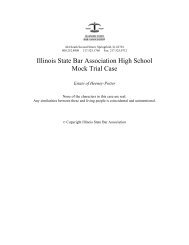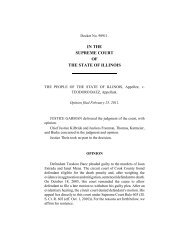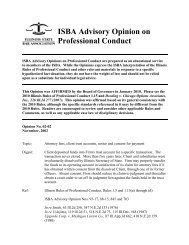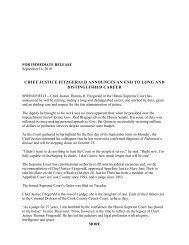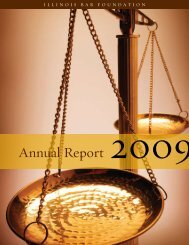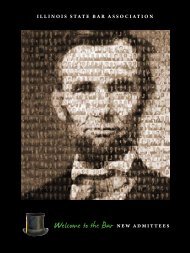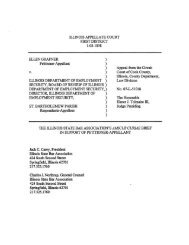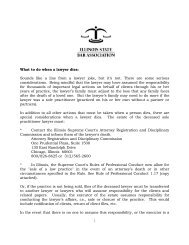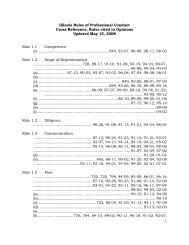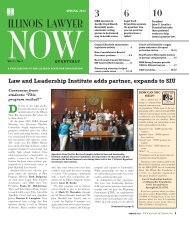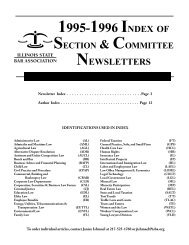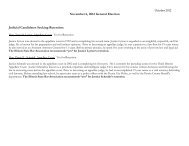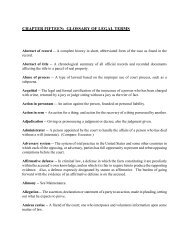MOTIONS TO DISMISS PURSUANT TO 735 ILCS 5/2-615 AND 2-619
MOTIONS TO DISMISS PURSUANT TO 735 ILCS 5/2-615 AND 2-619
MOTIONS TO DISMISS PURSUANT TO 735 ILCS 5/2-615 AND 2-619
Create successful ePaper yourself
Turn your PDF publications into a flip-book with our unique Google optimized e-Paper software.
SECTION 2-<strong>615</strong> <strong>MOTIONS</strong> <strong>TO</strong> <strong>DISMISS</strong><br />
1. The Statute<br />
The Illinois Civil Practice Act provides that motions attacking the sufficiency of the<br />
pleadings should be filed pursuant to § <strong>735</strong> <strong>ILCS</strong> 5/2-<strong>615</strong>, which provides:<br />
Motions with respect to pleadings.<br />
(a)<br />
(b)<br />
(c)<br />
(d)<br />
(e)<br />
All objections to pleadings shall be raised by motion. The motion shall point out<br />
specifically the defects complained of, and shall ask for appropriate relief, such as:<br />
that a pleading or portion thereof be stricken because substantially insufficient in<br />
law, or that the action be dismissed, or that a pleading be made more definite and<br />
certain in a specified particular, or that designated immaterial matter be stricken out,<br />
or that necessary parties be added, or that designated misjoined parties be dismissed,<br />
and so forth.<br />
If a pleading or a division thereof is objected to by a motion to dismiss or for<br />
judgment or to strike out the pleading, because it is substantially insufficient in law,<br />
the motion must specify wherein the pleading or division thereof is insufficient.<br />
Upon motions based upon defects in pleadings, substantial defects in prior pleadings<br />
may be considered.<br />
After rulings on motions, the court may enter appropriate orders either to permit or<br />
require pleading over or amending or to terminate the litigation in whole or in part.<br />
Any party may seasonably move for judgment on the pleadings.<br />
2. Pleadings To Be Construed Liberally<br />
Section 2-603(c) of the Code further provides that “pleadings shall be liberally construed<br />
with a view to doing substantial justice between the parties.” <strong>735</strong> <strong>ILCS</strong> 5/2-603(c).<br />
Under the Illinois Civil Practice Code, “no pleading is bad in substance which contains<br />
such information as reasonably informs the opposite party of the nature of the claim or defense<br />
which he or she is called upon to meet.” <strong>735</strong> <strong>ILCS</strong> 5/2-612(b); Forest Preserve District of<br />
DuPage County v. Miller, 339 Ill.App.3d 244, 252, 789 N.E.2d 916, 923 (2 d Dist. 2003); People of<br />
the State of Illinois ex rel. Hartigan v. Candy Club, 149 Ill.App.3d 498, 500, 501 N.E.2d 188, 190<br />
(1 st Dist. 1986); Kita v. Young Men’s Christian Association of Metropolitan Chicago, 47<br />
Ill.App.2d 409, 425, 198 N.E.2d 174, 182 (1 st Dist. 1964).<br />
“A cause of action should not be dismissed pursuant to a section 2-<strong>615</strong> motion unless it is<br />
clearly apparent that no set of facts can be proved that would entitle the plaintiff to relief.” Pooh-<br />
Bah Enterprises, Inc. v. County of Cook, 232 Ill. 2d 463, 473, 905 N.E.2d 781, 789 (2009);<br />
Napleton v. Village of Hinsdale, 229 Ill.2d 296, 305, 891 N.E.2d 839, 845 (2008). Kindel v.<br />
Tennis, 409 Ill. App. 3d 1138, 949 N.E.2d 1119 (5th Dist. 2011).<br />
2



